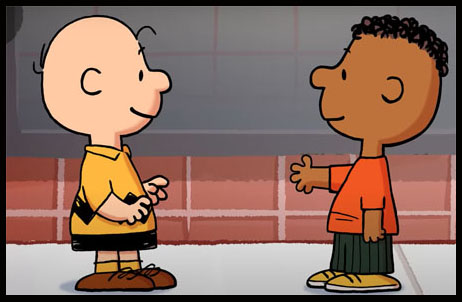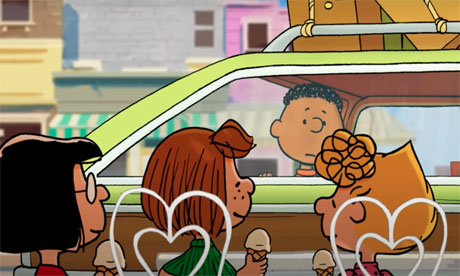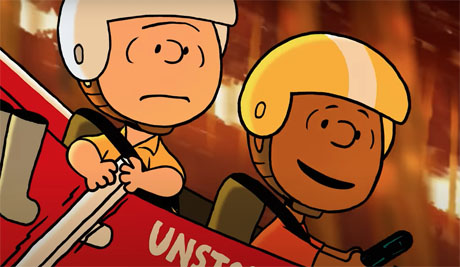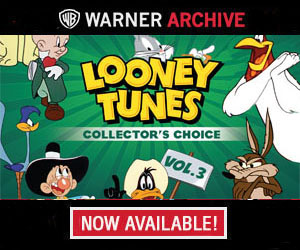
Sweet new special Snoopy Presents: Welcome Home, Franklin premieres this Friday February 16th on AppleTV+. Co-writer Robb Armstrong, director Raymond S. Persi and executive producer Craig Schulz reflect on their — and the entire world’s — longtime affection for the Peanuts crew. (This Animation Scoop Q&A was edited for length and clarity.)
Jackson Murphy: Robb, I want to start with you and your overall goals for wanting to present Franklin to a new generation of kids and their parents and grandparents. I know this character has meant so much to you.
Robb Armstrong: Yes, there’s a personal connection there. When Franklin was named after me, it was 1994. I don’t want anyone to think that I’m too young to have been the inspiration for Franklin. I’ve read online somewhere that I was. (laughs) I was six years old when Franklin was introduced to Peanuts. But in 1994, my then friend Sparky Schulz called me and said he’d like to give Franklin my last name, which was beyond an honor. It was quite uncomfortable at the time. I felt weird even talking about it. I didn’t tell anyone for 12 years. And I finally spilled the beans. I was giving a speech at The Charles M. Schulz Museum, which by the way, if you haven’t been, this is a bucket list place to visit. I was giving a speech to a small group, and I said, “Yeah, you know that guy on the wall right there? That’s Franklin Armstrong. He was named after me.” And I just dusted… blew past the mark, the comment, and his widow walked up to me afterwards, Jeannie Schulz, and said, “Huh, how come you never told me that?”

Robb Armstrong: I said, “Well, I don’t know, Jeannie. It’s a personal thing. It was a compliment, you know.” She says, “Nah, nah. It’s a big deal.” I think she made some phone calls because NPR called me not long after that and some other outlets. Fast forward to today, man. I’m not uncomfortable or feeling unworthy anymore. “Welcome Home Franklin” is the realization of a massive purpose and a massive idea and a lot of bravery and a lot of art. Not just in that special, but this team I’m with. Raymond Persi, this amazing director, Craig Schulz, his son, Brian Schulz, Cornelius Uliano — to be a part of… And I identify with Franklin coming into this established thing and feeling like I better win. (laughs) I have to succeed so they’ll like me. So it’s been purposeful. And we live in times now that resemble the 1960s when Harriet Glickman said, “Hey, it’s time for a change. You can be a part of it.” Now we live in troubled times again. And I think that the timing is quite sublime, really. Pitch perfect.
JM: There’s a lot of heart to this special. It’s about Franklin, in a new town, meeting new friends. And Raymond, in the introduction, I think you present in such an authentic, honest way this kind of feeling of, “I got to leave my friends that I thought I had before behind and have this fresh start.” How was it for you bringing us into this special?
Raymond S. Persi: It was a really fun challenge. Seeing in the script how he gets to travel on Route 66 across the country. And we discussed, “What are some of the different places he would stop at?” And using that as an opportunity to show his loneliness. One of the things I love about the character is he’s a very positive character. He doesn’t give up. So he’s not walking around sad about this all the time. He’s trying to just keep going, keep trying to make new friends, reset every time he goes somewhere. And I think when he meets Charlie Brown, it’s kind of a kindred spirit, because Charlie Brown’s also a guy that has a terrible day, and he resets the next day. “Maybe today will be the good day.” They had something in common to connect with there.

Director Raymond S. Persi
JM: I love the bond that Franklin and Charlie Brown have. Craig, for you, seeing these two guys meet each other, form this friendship, the ups and downs that come along with it. What does that mean to you to have this be shown in this special in such an intimate and really strong way?
Craig Schulz: Well, I think it’s important for kids to realize how these relationships are formed and how difficult and how easy it can and cannot be. You think of poor Franklin — he’s been to all these different places, and he’s adapted to his environment by how he approaches new kids. He’s got his little cheat sheet book his grandfather gave him with all the questions and all the jokes. But now he’s dropped off in this neighborhood where those things don’t work anymore. He’s got a kid in the pumpkin patch he tries to help and he ends up ruining the pumpkin patch. He goes [to the lemonade stand] and steals Lucy’s lemonade. All his stuff in the past is not working. And then it comes across good old Charlie Brown, and Charlie Brown is kind of the one solid, stable platform in that whole crazy neighborhood. And Charlie Brown being the loser and [Franklin] being the new kid — they get shunned by everybody else. We use the analogy of dodgeball. The last two kids in dodgeball get picked and now they’re forced together in this car racing competition. And then you see the relationship blossom based upon that. You’ve got these two isolated souls that come together to become a kindred spirit. I think it’s wonderful.

JM: Yeah. I think families are going to love this. Robb, I love the moments in this special when you touch on the military and baseball and music in the conversations that Franklin and Charlie Brown have and in other moments in the special. To me, that’s core “Peanuts”. It takes us back to the time when these specials first started in the ’60s and to just bring that around for the new generation. How important was it for you to include those elements in this?
RA: Enormous. Well, first of all, I wanted to remind anyone [reading] this of how cohesive this team was the entire time. And we still are. These are my friends. I respect them as artists, as writers, as thinkers. You start with a story and then you break it down into acts and then you can break it down to these scenes. And every single scene contains moments. And these are tedious times. We’re different human beings. We want to do things. So when the team says, “Hey, Robb, what do you think the music should be?” I ended up giving these guys a gigantic list of music because the alternative was… my knee jerk reaction was let’s come up with a new Vince Guaraldi. When you hear Vince Guaraldi’s music, you think of “Peanuts”. It’s a unique phenomenon. I don’t think there’s anything else like it, where you hear an artist and you go, “That’s that!” So I thought, “Let’s do a Black Vince Guaraldi.” Let’s have John Coltrane. He has a song called “One Down, One Up”, which has a kind of a Guaraldi vibe to it.
“So let’s have [that] play whenever you see Franklin.” But that was dumb, you know? (laughs) He’s not going to recreate what Vince Guaraldi did by throwing Coltrane in there every time you see this kid. So it took some time. We had to all figure out. No one likes seeing a list this long. It wasn’t practical and we whittled it down to really representing era. So, the Franklin stuff is more about era of genre — a kind of a jazzy, smart, very cool thing. Apple likes it so much that Spotify has got a whole thing you can actually purchase. It’s wonderful. It worked out to be the smartest solution. Everything you’re seeing in this special is that — very ambitious ideas whittled down, smartened up so that this character shines through and not our individual opinions. Franklin is another one of us at this point, me and this guy and this guy, this guy and Franklin. He’s real.

JM: These characters bring such real emotions out of us and fun excitement too. You’ve got the soapbox derby element and Raymond, how was it creating that? The special opens with that and then we come back to it later on. It’s really fun and energetic and fast. You really do a good job with that.
RP: Oh, thanks. With a special like this that’s so intimate and quiet — two people slowly becoming friends — you want to kind of bookend it with something exciting. It was so great in the script to see there’s gonna be a soapbox derby race and all the kids are gonna be flying around all over the place. The animation team, my entire production team, really did an amazing job putting it together. Finding new ways to push the technology we use. They just really pushed it to the edges of what it could do to get it there. I had to use all of my expertise and experiences over the years, all different projects I worked on, in that sequence to get it there. A lot of back and forth. And the best part about it is it’s not just there for the sake of it. It’s there to push the story forward. There’s this huge thing that happens. Franklin, a kid who came in thinking the best way to make friends is to be a winner, because everyone loves winners, makes the ultimate sacrifice. To me, that’s the best reason for that race to exist. You need the action to have a purpose.

Craig Schulz
CS: Number one, you have to trust your director (laughs), which is great, so we trusted Raymond when he came on board. But I think the important thing there was that people historically will think of Charlie Brown’s best friend as being Linus because he truly is his best friend at that point. And for us to have Charlie Brown verbally acknowledge this Black character coming in the neighborhood is now like a best friend, I think is an important message universally. We can have best friends that don’t look like us, and I think that’s what we want to get across in that scene. All kids kind of are that way when you’re a third or fourth grader on the playground, and you’re playing four square or tetherball. You don’t care what the other kid looks like, or what his parents look like, or who they are. You’re just playing with the kid. You take them for who they are. A lot of good messages to be taken from this series.
JM: I know there’s a new Peanuts movie coming to AppleTV+ that you’re working on, which is wonderful. Robb, 30 years ago, Peanuts changed your life. What do you hope 30 years from now is the Peanuts legacy? Yes, this movie’s coming in the next couple years, probably. Where do you see Peanuts in 30 years?

Robb Armstrong
But I want another cartoonist other than me to experience something magnificent like this. And I want to pass the torch. I’m involved with young kids in college and doing internships. We have something called The Armstrong Project I’m involved in with Peanuts Worldwide to make sure that interns come up behind us from HBCUs, Hampton, Howard. I want to see what they can do. I want to see what young people can do.
- INTERVIEW: Jeff Fowler On “Knuckles” And “Sonic 3” - April 22, 2024
- INTERVIEW: “Inside Out 2” Director And Producer On Pixar Sequel - April 16, 2024
- INTERVIEW: “Puffin Rock And The New Friends” And 25 Years Of Cartoon Saloon - April 10, 2024


 February 12th, 2024
February 12th, 2024  Jackson Murphy
Jackson Murphy  Posted in
Posted in  Tags:
Tags: 






